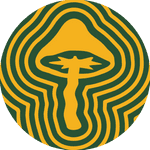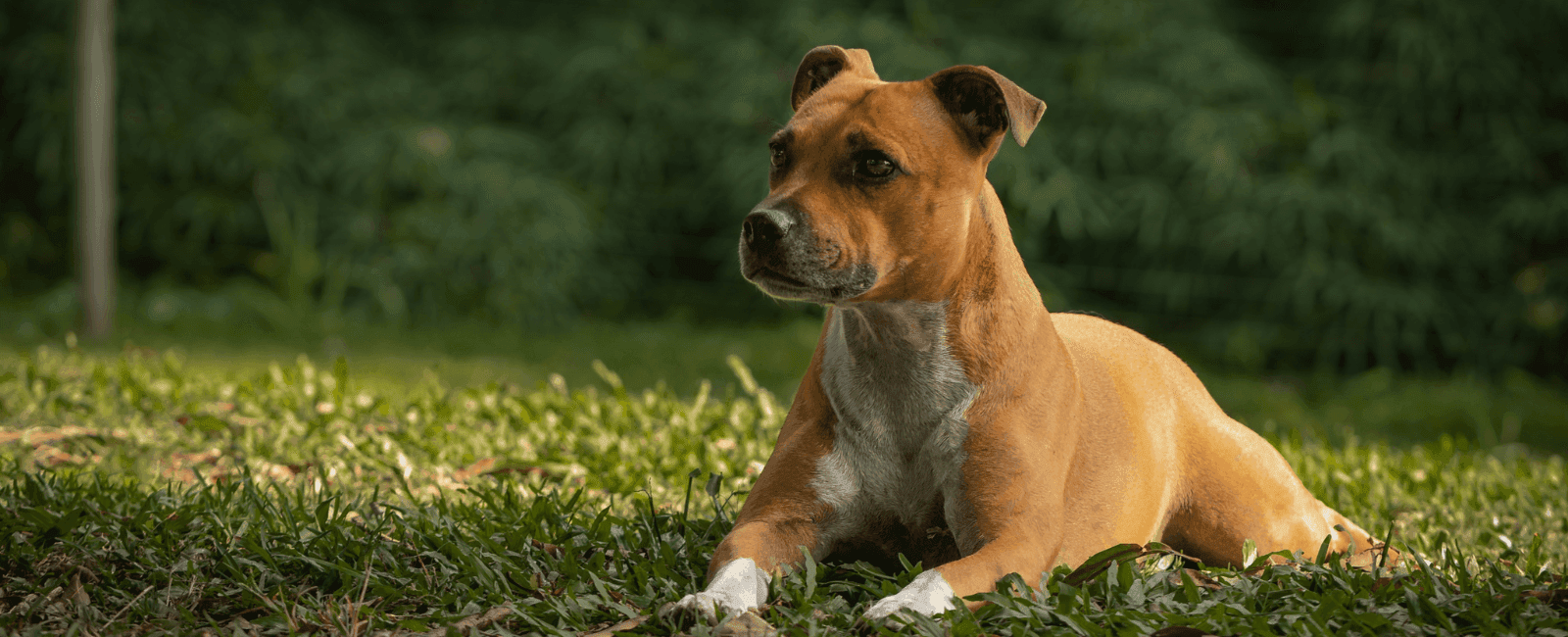

If your dog has been diagnosed with cancer, you may be scouring the internet looking for ways to give them a fighting chance of beating the disease and having the best quality of life. Cancer in dogs is unfortunately very common, as around 50% of dogs above the age of ten will develop cancer. Though this news is bleak, dog cancer can be cured if caught early enough and treated properly. With the help of veterinary medicine, your canine friend can receive different forms of cancer treatments, such as radiation, surgery, and chemotherapy. However, these treatments can have adverse side effects like inflammation, reduced appetite, and infections. This is because chemo can kill off beneficial cells along with cancer cells, decreasing immunity, which is the last thing your dog needs while fighting off a deadly disease.
If your dog is undergoing treatment and you’re seeking a way to reduce the negative effects, or you want a more holistic way of fighting off their cancer, medicinal mushrooms may be incredibly helpful for your dog’s healing process. These mushrooms are not only safe for dogs but also scientifically proven to have several health benefits, like anti-tumor properties, immune support, and inflammation reduction.
Best mushrooms for dogs with cancer
Maitake

Maitake (Grifola frondosa), otherwise known as hen of the woods, is an edible mushroom with several medicinal properties. When it comes to fighting canine cancer, maitake mushrooms are an effective treatment due to their abundance of beta-glucans, a soluble fiber with potent anti-inflammatory properties (1). Beta-glucans are important because cancer and chemo can increase inflammation, leading to worsening tumors. An increase in inflammatory cells progresses tumors and can exacerbate tumor progression.
D-Fraction is a beta-glucan specific to maitake that has been extracted and studied for its anti-cancer and anti-tumor effects. The polysaccharide compound can enhance the immune system. In one study done on human cancer cells, D-Fraction was found to activate NK cells that kill infected cells and fight against cancer (2). As a result, it reduced tumor growth and the advancement of metastatic cells. D-Fraction is also used in combination with chemotherapy and has shown promise in reducing cancer progression.
Another study done on a group of dogs with lymphoma received two doses of D-Fraction a day for twelve weeks and experienced no negative side effects, proving that the compound is safe and well tolerated in dogs (3).
Chaga
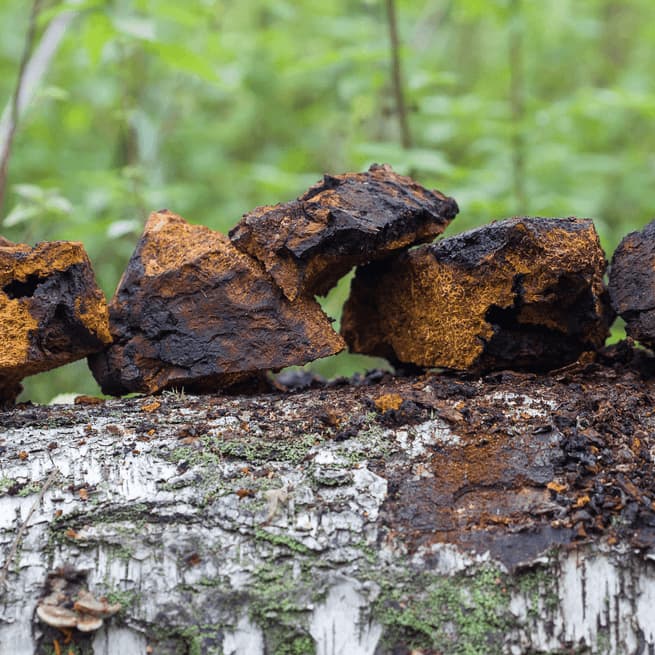
Chaga (Inonotus obliquus) is also very high in beta-glucans. Plus, it has incredibly high antioxidant levels — one of the highest in the world for any natural food. Antioxidants have been shown to protect the body from free radicals, which are unstable and highly reactive molecules that can manifest as diseases like cancer. In one scientific study, combining antioxidant treatment with chemo increased the survival times of cancer patients and the efficiency of their therapy (4). Chaga mushrooms also help fight cancer through a triterpenoid compound called lanostane, producing immune-boosting T cells, a white blood cell that protects the body against infections and malignant cells.
According to one animal study, Chaga is incredibly successful at reducing cancer cells and tumor growth. Researchers found a 60% reduction in mouse tumor size after treating them with chaga mushroom extract for three weeks (5). A study done on human cancer cells also found cancer-inhibiting properties in the mushroom, demonstrating its ability to destroy cancer cells (6).
Shiitake
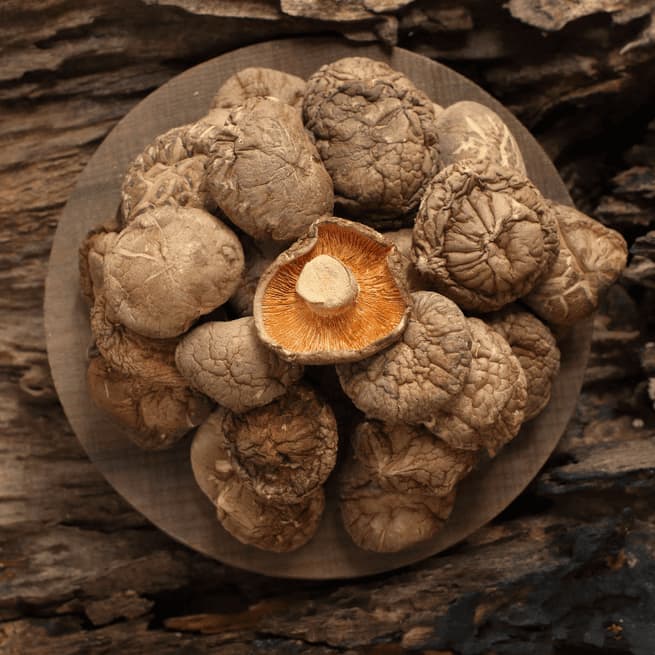
The shiitake mushroom (Lentinula edodes) is known for its delicious flavor, but its also a highly effective functional mushroom for dog cancer treatment. Shiitake are high in beta-glucans, notably lentinan, which is found in its mycelium. Lentinan has been tested in multiple studies for its ability to reduce tumor growth and kill cancer cells.
Researchers have found that using lentinan as an adjunct therapy can improve chemotherapy response rates and survival time. Even those with advance stage tumors saw an extra year of survival rate and experienced better overall health and quality of life (7).
A different study investigated the effects of lentinan extracts on mice with sarcoma. It concluded that the compound hindered the development of the cancer cells, leading to an almost complete regression of their tumors (8).
Shiitake also has amino acids called tryptophan and arginine, which have been shown to regulate the production of NK cells and have immune-modulating properties (9). Plus, shiitake and its mycelia are an excellent source of cancer-fighting antioxidants.
Reishi

Used in traditional Chinese medicine to support the immune system, the reishi mushroom (Ganoderma lucidum) is a very common holistic method of treating cancer. In Japan and China, reishi is used alongside traditional cancer treatments like radiation and chemo as an adjunct therapy. The mushroom is high in polysaccharides, but its most studied ones are PSP and PSK, which are isolated and used as anti-cancer medicines.
In multiple preclinical trials, the compounds in reishi have demonstrated the ability to significantly increase immunity in human cancer patients. Those who took reishi extracts saw improvement in their cancer-related symptoms and saw longer survival times due to reishi’s antitumor activity (10).
Furthermore, reishi helps the body adjust to stress and fatigue, allowing it to react more calmly to external factors such as any pain and anxiety your dog may face during their cancer treatment. This is because reishi is considered an adaptogen, a natural substance that helps normalize stress within the body. Though cancer may be taxing on your dog’s mental and emotional health, an adaptogen like reishi can help improve their mood and boost their energy levels so that they can feel more at ease.
Lion’s mane

The lion’s mane mushroom (Hericium erinaceus) is not only a powerful nootropic but also a well-studied cancer treatment.
One study, done on mice with cancer found that lion’s mane extract reduced the formation of tumor nodules by around 50%. The extract also caused cancer cell death and reduced the growth of cancer cells by 66%. The results concluded that lion’s mane extract is an effective antimetastatic cancer treatment (11).
Another human study determined that lion’s mane extract is a safe and effective treatment against several different cancers. Researchers found that the lion’s mane extract worked better and had fewer adverse side effects than 5-FU, a common chemotherapy drug (12).
Lion’s mane is also an adaptogen with anti-depressant properties. Depression is common among dogs with cancer due to pain and loss of senses like smell. Though your dog may not be feeling their best, lion’s mane can help. Studies show that the mushroom is highly effective at treating mild to moderate forms of anxiety and depression (13).
Turkey tail

The turkey tail mushroom (Coriolus versicolor or Trametes versicolor) is a highly popular mushroom for treating cancer. The FDA has approved the common fungus in several clinical trials for cancer patients undergoing chemotherapy. Turkey tail is also used in Japan and China as an adjunct therapy for cancer. It contains polysaccharides PSP and PSK, which are often extracted from the mushroom for their anti-tumor and immunomodulatory properties.
Researchers have tested PSP on dogs with a highly metastatic skin cancer called hemangiosarcoma. They found that high doses of the compound increased survival time and delayed the growth of malignant tumors (14).
Turkey tail is also incredibly high in antioxidants and beneficial beta-glucans to kick cancer to the curb safely and effectively.
Mushroom supplements for dogs with cancer
There are many different types of mushroom supplements, including mushroom blends, chews, and tinctures. Using pre-formulated products is the simplest way to include medicinal mushrooms in your dog’s diet. Here are some of the top mushroom supplements for dogs with cancer:
Canine Matrix Turkey Tail Organic Mushroom Holistic Supplement for Dogs
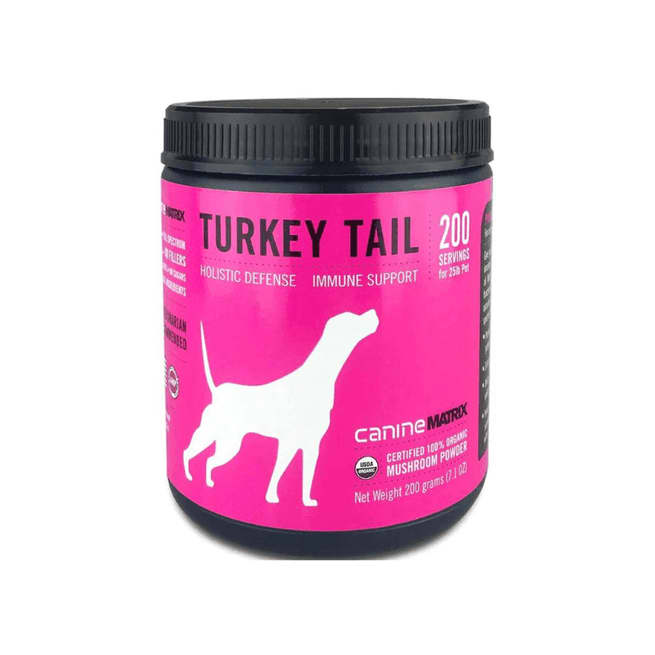
This USDA-certified organic powdered supplement contains all of the beneficial polysaccharides found in Turkey tail mushrooms. You can use this powder daily by sprinkling the recommended dosage on your dog’s food to give them an extra immune boost.
Shroomies Immunity Bites for Dogs

Freshcap’s medicinal mushroom dog chews are an easy way to implement the benefits of functional mushrooms into your dog’s daily routine. Shroomies are formulated with a high-quality blend of seven-function mushroom extracts made from 100% pure mushroom fruiting bodies, plus other helpful ingredients such as turmeric and omega-3 fatty acids.
Seven ‘Shrooms - Organic Mushroom Mix
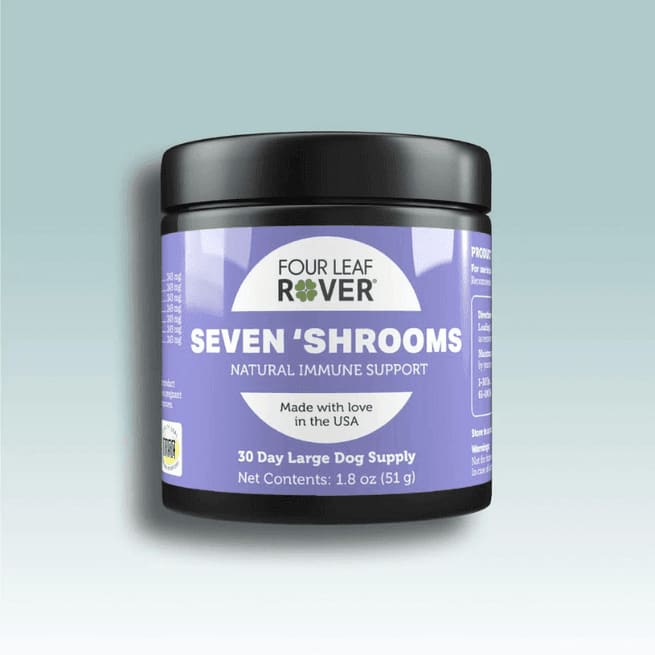
This mushroom powder contains a potent combination of turkey tail, reishi, cordyceps, maitake, phellinus, shiitake, and chaga mushrooms. Seven ‘Shrooms uses only whole mushrooms and double extracts them to reap the maximum benefits of the beta-glucan and triterpenoid content, making it perfect for boosting your dog’s immunity and helping them fight off cancer.
Pet Wellbeing - Mushroom Immune Gold
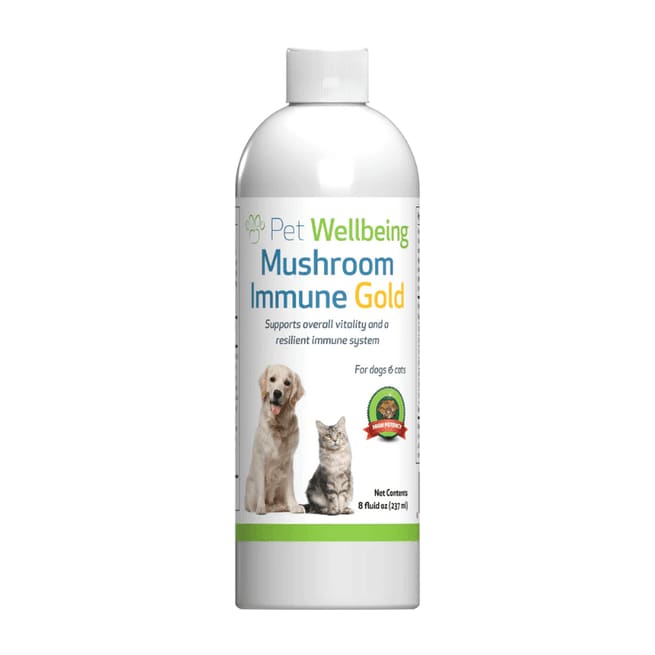
Mushroom Immune Gold is formulated with the botanical extracts of several different medicinal herbs and mushrooms, including turkey tail, maitake, reishi, and milk thistle seed. This liquid supplement is made specifically to help treat cancer and work against any negative chemotherapy side effects.
A helpful addition to your dog’s cancer treatment
Dog cancer is a stressful ordeal for you and your canine companion, but mushrooms can be an effective treatment on their own or alongside traditional treatments. Though medicinal mushrooms may not be the miracle cure for cancer, they can potentially work alongside veterinary intervention and ease your dog’s symptoms for the different types of cancer.
If your dog is already going through chemotherapy or radiation treatments, treating them with one or several of the scientifically-backed mushrooms on this list can help reduce any adverse side effects and even improve the effectiveness of the treatment.
References
- Su, Chun-Han, Mei-Kuang Lu, Ting-Jang Lu, Ming-Nan Lai, and Lean-Teik Ng. 2020. “A (1→6)-Branched (1→4)-β-D-Glucan from Grifola Frondosa Inhibits Lipopolysaccharide-Induced Cytokine Production in RAW264.7 Macrophages by Binding to TLR2 rather than Dectin-1 or CR3 Receptors.” Journal of Natural Products 83 (2): 231–42. https://doi.org/10.1021/acs.jnatprod.9b00584.
- Kodama, Noriko, Kiyoshi Komuta, and Hiroaki Nanba. 2003. “Effect of Maitake (Grifola Frondosa) D-Fraction on the Activation of NK Cells in Cancer Patients.” Journal of Medicinal Food 6 (4): 371–77. https://doi.org/10.1089/109662003772519949.
- Konno, Sensuke. 2004. “Potential Growth Inhibitory Effect of Maitake D-Fraction on Canine Cancer Cells.” Veterinary Therapeutics: Research in Applied Veterinary Medicine 5 (4): 263–71. https://pubmed.ncbi.nlm.nih.gov/15719326/.
- Singh, Kanchanlata, Mustansir Bhori, Yasar Arfat Kasu, Ganapathi Bhat, and Thankamani Marar. 2018. “Antioxidants as Precision Weapons in War against Cancer Chemotherapy Induced Toxicity – Exploring the Armoury of Obscurity.” Saudi Pharmaceutical Journal : SPJ 26 (2): 177–90. https://doi.org/10.1016/j.jsps.2017.12.013.
- Arata, Satoru, Jun Watanabe, Masako Maeda, Masato Yamamoto, Hideto Matsuhashi, Mamiko Mochizuki, Nobuyuki Kagami, Kazuho Honda, and Masahiro Inagaki. 2016. “Continuous Intake of the Chaga Mushroom (Inonotus Obliquus) Aqueous Extract Suppresses Cancer Progression and Maintains Body Temperature in Mice.” Heliyon 2 (5): e00111. https://doi.org/10.1016/j.heliyon.2016.e00111.
- Youn, Myung-Ja, Jin-Kyung Kim, Seong-Yeol Park, Yunha Kim, Se-Jin Kim, Jin Seok Lee, Kyu Yun Chai, et al. 2008. “Chaga Mushroom (Inonotus Obliquus ) Induces G0/G1 Arrest and Apoptosis in Human Hepatoma HepG2 Cells.” World Journal of Gastroenterology 14 (4): 511. https://doi.org/10.3748/wjg.14.511.
- Antonelli, Michele, Davide Donelli, and Fabio Firenzuoli. 2020. “Lentinan for Integrative Cancer Treatment: An Umbrella Review.” Proceedings 79 (1): 1. https://doi.org/10.3390/IECBM2020-08733.
- Chihara, Goro, Junji Hamuro, Yukiko Y Maeda, Yoshiko Arai, and Fumiko Fukuoka. 1970. “Fractionation and Purification of the Polysaccharides with Marked Antitumor Activity, Especially Lentinan, from Lentinus Edodes (Berk.) Sing. (an Edible Mushroom)1.” Cancer Research 30 (11): 2776–81. https://aacrjournals.org/cancerres/article/30/11/2776/477919/Fractionation-and-Purification-of-the.
- Tantawy, Ahmed A., and Deyala M. Naguib. 2019. “Arginine, Histidine and Tryptophan: A New Hope for Cancer Immunotherapy.” PharmaNutrition 8 (June): 100149. https://doi.org/10.1016/j.phanu.2019.100149.
- Jeitler, Michael, Andreas Michalsen, Daniela Frings, Marisa Hübner, Moritz Fischer, Daniela A. Koppold-Liebscher, Vijay Murthy, and Christian S. Kessler. 2020. “Significance of Medicinal Mushrooms in Integrative Oncology: A Narrative Review.” Frontiers in Pharmacology 11 (November). https://doi.org/10.3389/fphar.2020.580656.
- Kim, Sung Phil, Seok Hyun Nam, and Mendel Friedman. 2013. “Hericium Erinaceus (Lion’s Mane) Mushroom Extracts Inhibit Metastasis of Cancer Cells to the Lung in CT-26 Colon Cancer-Tansplanted Mice.” Journal of Agricultural and Food Chemistry 61 (20): 4898–4904. https://doi.org/10.1021/jf400916c.
- Li, Guang, Kai Yu, Fushuang Li, Kangping Xu, Jing Li, Shujin He, Shousong Cao, and Guishan Tan. 2014. “Anticancer Potential of Hericium Erinaceus Extracts against Human Gastrointestinal Cancers.” Journal of Ethnopharmacology 153 (2): 521–30. https://doi.org/10.1016/j.jep.2014.03.003.
- Chong, Pit Shan, Man-Lung Fung, Kah Hui Wong, and Lee Wei Lim. 2019. “Therapeutic Potential of Hericium Erinaceus for Depressive Disorder.” International Journal of Molecular Sciences 21 (1): 163. https://doi.org/10.3390/ijms21010163.
- Brown, Dorothy Cimino, and Jennifer Reetz. 2012. “Single Agent Polysaccharopeptide Delays Metastases and Improves Survival in Naturally Occurring Hemangiosarcoma.” Evidence-Based Complementary and Alternative Medicine: ECAM 2012. https://doi.org/10.1155/2012/384301.


